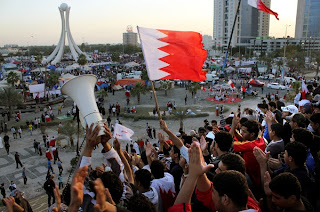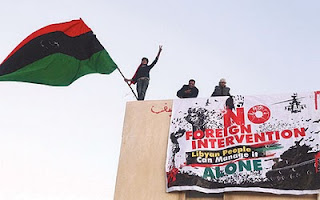 |
| Clinton tells Senate Al Jazeera is "real news" |
Among the 2011 Arab revolts, Libya was always the worst case scenario. The country's crazy dictator pledged to fight to the last to protect his regime. By mid-March, it looked like the rebels didn't have the experience or the resources to win. Qaddafi was taking back one rebel stronghold after another, and moving on the main one, the city of Benghazi. It was painful for the rest of the world to watch that. The usual US hawks, McCain and Lieberman, were joined by Kerry in calling for the euphemistically named "no-fly zone." That means western military intervention in an oil-rich Arab country, when nothing of the kind has happened in other, less strategically interesting, countries where rebels have been massacred. As Robert Gates pointed out, a no-fly zone (during a time of conflict) usually implies aerial attacks. But as it turned out, America seemingly had the cover of the Arab League, a UN resolution, and lobbying by the UK, France, with Belgium, Spain and Canada promising to participate. So now it has begun" "Operation Odyssey Dawn." The Libyans are not wholly fighting their own battles anymore. Of course some Libyan rebels desperately called for outside help. And Benghazi has celebrated the no fly zone. But where will it all go now? The essence of the wave of revolutionary spirit across the Arab world has been that its origins were indigenous. With outside intervention the specter arises of all the old foreign support that kept corrupt regimes in power so long. Now Amr Moussa, the head of the Arab League, has already condemned the intense western-initiated air strikes for causing more civilian casualties instead of preventing them. Yes, that's right. The Arab League has had second thoughts. But intervention is hard to undo.
"So we are going to take 'all necessary measures' to protect the civilians of Libya, are we?" Robert Fisk wrote yesterday. "Pity we didn't think of that 42 years ago." Indeed. Though you can always predict interventions by a colonial power will come, you never quite know when they're coming. It seems to be a matter of sheer impulse. Maybe what's going on in Libya has just been too visible for the western powers to overlook it this time. While with Egypt the US wouldn't get involved, with Libya it's gotten much too involved.
Speaking of interventions, last week the Saudis sent troops to help the Bahrain regime put down mounting demonstrations. The United Arab Emirates sent police there too. The US stays neutral to that. An Obama spokesman says it's not a foreign invasion, not at all.
Hillary Clinton went to Egypt to meddle a little in their revolution. A group of young revolutionaries, the January 25 Revolution Youth Coalition, refused to meet with her to underline that she was still supporting Mubarak when their rebellion was well under way and that the US should formally apologize for its policies toward Egypt in past decades. Hillary surprised us last week by praising Al Jazeera for at lest presenting "real news," unlike the US mainstream media. Unfortunately she was pushing for more money for US propaganda abroad. Meanwhile "the angry Arab," As'ad Abu Khalil of California State University, Stanislaus, seconded by Chicago progressive blogger Stephen Lendman, has been attacking Al Jazeera (Arabic and English, not always differentiated) for using unreliable reporters, going soft on revolts in the kingdoms (vs. the republics), even citing Hillary's praise as a sign that the Qatar station has become a tool of the West. These claims do not gibe with my observation. Al Jazeera Arabic still takes you to events in he Arab world like no other news agency. Just remember, when you're in a combat zone, you don't often know what's going on. But it's better to be there than in London or Washington analyzing events you can't see. It is true Al Jazeera English is much more like the BBC, but it also has articles by decidedly non-establishment younger commentators like Mark LeVine of UC Irvine. It's not an easy task to critique 24/7 "real news" coverage from multiple sources about rapidly changing situations. Al Jazeera is worth following.
Also on Al Jazeera English LeVine has published an interview with the Egyptian singer/songwrier Ramy Essam, author of the revolutionary anthem, "Irhal," expressing fears of an Egyptian counter-revolution. The situation in Egypt is extremely complex now. The first blush of the revolution when Mubarak stepped down has faded and there are many dangers. As was said at the beginning, the primary risk is in acting too fast, before new leadership can organize, which would allow the old powers of army, Muslim Brotherhood, and Mubarak's NDP to step forward and take over. For the new forces in Egypt the referendum on constitutional changes (passed today) may have gone too fast, and Mohamed AlBaradei was attacked by thugs while voting on it. Essam was one of many beaten by thugs and according to his account arrested by army officers in Tahrir Square a month after the revolution. He says Facebook has become a two-edged sword, used by the young activists but also now a tool of misinformation by counter revolutionaries. Still, there remains a new awareness in Egypt and a spirit of hope and activism. Rami Essam has not given up and neither should we.
 |
| Rami Essam shows torture wounds |
 |
| Pearl Roundabout in Manaama, Bahrain, site of repression now |
 |
| UN camp for Bangladeshi refugees from Libya |
 |
| ElBaradei leaves referendum vote after being attacked by thugs |





